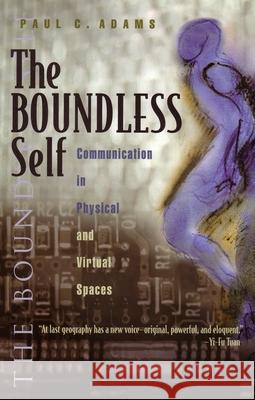The Boundless Self: Communication in Physical and Virtual Spaces » książka
The Boundless Self: Communication in Physical and Virtual Spaces
ISBN-13: 9780815630562 / Angielski / Twarda / 2005 / 252 str.
Using the body as an axis for geographical theory, this book argues that communication empowers self to constantly transcend its physical limits. It urges complete review of personal borders in space and time based on symbols, signs and signals that redefine ties to the tangible world, i.e., "Dear John" letters, layout of furniture in rooms, or chronic illness. Paul C. Adams shows how vehicular transit has altered traditional modalities like walking or biking while navigation of space and virtual space has led to "boundary blurring." He covers transforming moments in communication from the rise of writing to invention of the printing press, telephone, and electronic media. To better understand human geography, he also plumbs the relation of space and time to notions of romance, identity, and meaning. Citing geographers throughout the ages and the effects of mercantile, industrial, and current global economies,











